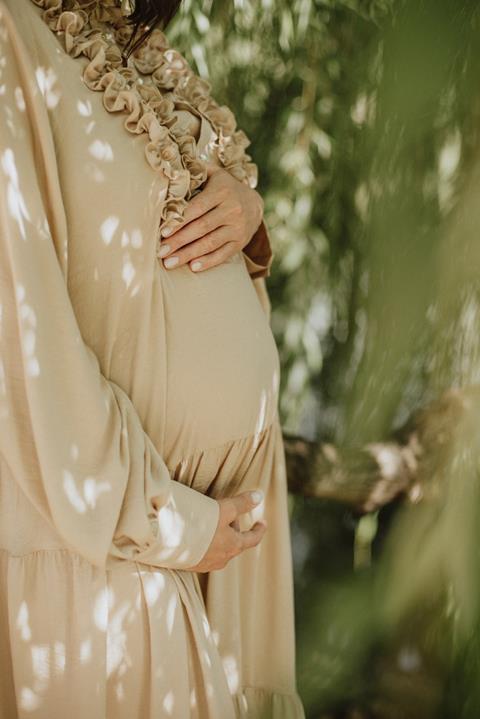Aude Lombard shares the story of losing her daughter at 36 weeks, and how God provided comfort and a transforming perspective
It was 2016 and my husband Baptiste and I had just moved to Scotland with our one-year-old son Raphaël. We were excited about what lay ahead, having just found out that I was pregnant with his little sister Juliette.
But one morning on the way to my 20-week ultrasound appointment, something switched. Like the wind changing direction without warning, I suddenly had the impression that something wasn’t right.
I convinced myself that it was all down to being in a new country, but a few moments into the scan, our bright world went dark. Our baby was unusually small for 20 weeks. Over the next week, we learned why.
Juliette had a genetic disease (Trisomy 13). She wouldn’t live after birth, they told us, or if she did, it would be for just a few hours, days or weeks at most.
Experiencing God’s joy in the midst of pain
At this stage we felt God gave us a choice: say ‘yes’ to this prognostic and walk through this valley of shadow of death with him, or refuse it and interrupt the pregnancy by terminating it. We chose option one – we said: “Yes God, we trust and will follow you.” From that moment, a tangible supernatural joy and strength came on us. And it never left.
The remaining four months were transforming. We practised haptonomy*, an approach that builds connection with the baby while in the womb. Juliette was very responsive, recognising our presence with kicks and somersaults during those final weeks up to her birth.
Though we knew Juliette would likely not stay with us long, we felt this inexplicable joy at the anticipation of welcoming her and the life that was there, whatever its length. We opened our hearts for God to reveal what message this little girl was carrying for us and for the world.
Naturally, we wanted Juliette to be healed. We wanted to watch her grow. I longed to see Juliette alive and to hear her baby gurgles. But we also had a sense that it wasn’t for us to tell God what he should do. No, it wasn’t good news, but we knew something good would come out of it. And God did show up!
Of course, there were dark moments along the way. Like the day I decided to search online to get an idea of what we would have to face. If there is one piece of advice I would pass on to anyone it is: don’t do this!
As soon as I entered ‘trisomy 13’ into the search box, photos of the worst possible cases came up: a child with a thumb on its forehead or with only one eye or six fingers. It hurt my mothering heart.
During the pregnancy we received support from our friends, neighbours and church members alongside the medical team. One of the members introduced us to CHAS (Children Hospice Across Scotland: chas.org.uk).
The charity has a vision to welcome and support children who are at the end of their lives, as well as their families. The CHAS team encouraged us to think about every possible outcome. Several were difficult to imagine but at least they helped us to decide what we didn’t want – like aggressive treatment that might cause undue suffering.

A precious gift
One day during my 36th week of pregnancy, Juliette’s tiny heart stopped. She was born a few days later on a Saturday in May at 6:34am. It was during this labour that I grasped a new depth of understanding of the sacrifice of Jesus on the cross. His presence in my suffering was tangible, both physical and emotional. I gave him everything that was dead inside me, all that wasn’t bearing fruit in my life.
In the weeks that followed, we visited our 90-year-old neighbour. She had been aware of my pregnancy and was very happy at the idea of a newborn in the neighbourhood. As she was hard of hearing, I had chosen not to tell her about the situation with Juliette while I was pregnant. I couldn’t imagine myself shouting the details at her.
The eventual news of Juliette’s death really saddened and surprised her. On the day Baptiste shared the news, her 22-year-old granddaughter was visiting. As they spoke about Juliette, the young girl remembered that when she was six years old, she had made a book of pictures in her French classes. These pictures told the story of a little French girl, who she had named Juliette.
The granddaughter and my neighbour went off to look for this book…and found it. There it was, the story of a little Juliette over the years: with pigtails, in autumn, opening her Christmas presents, skiing, at Ascension Day, at the beach.
They gifted us the book, telling us how the connection with our story was so moving. One of these drawings, on a loose sheet slipped between the book’s pages, depicts a red robin, precisely the name of the house (Robin House at the CHAS) that welcomed us after Juliette’s death.
The experience felt like a message that Juliette really existed and that she could have lived all these moments. We received this book as a wonderful encouragement. Juliette lived briefly, but she truly has a story, her story, and this was meticulously prepared, at least 17 years beforehand!
God’s invitation
Through Juliette, we rediscovered in a new way how much heaven is real. Her full destiny was meant to be in heaven and God gave us the grace to co-lead her to its fulfillment. Some things we do will remain on earth but other actions have an eternal impact. My daughter opened me to this reality and the question: “What eternal fruits can I sow on earth?”
I also learned that we need to be real with emotional pain. It’s quite natural to avoid pain and distress, but it’s so important to embrace this process and the many treasures during times like these.
As it says in Psalm 23:4: “Even though I walk through the valley of the shadow of death, I will fear no evil, for You are with me; Your rod and Your staff, they comfort me” (NKJV). We are invited to cross this valley with the assurance that God will remain with us. It is also a promise that there is something after this crossing. It’s never the end of the story and that is what is exciting. It is an invitation of transformation; a sense of expectation that there’s more to grasp in this season.
I still asked the question: “Why?” Why didn’t God perform a miracle? Why did it happen to us? But, with gentleness, God invited me to switch my questions from the ‘why’ to the ‘how’ or ‘what’. “What do I do now with what happened?” “How can it help others?”
Only then could I start to understand my story and grasp a sense of purpose and hope. Someone once said that hope is a joyful anticipation of good and it feels that this ‘shift’ was a way to experience loss with a sense of hope and not despair. God is always good.
He will not leave us in pain but will use it to bear fruit in our lives, if we accept the invitation.
* Haptonomy is a popular French technique that emphasises the power of touch during pregnancy.
Aude tells her full story in her book, Juliette. Find out more at www.juliettebook.com































No comments yet